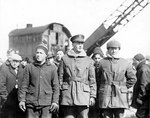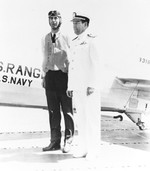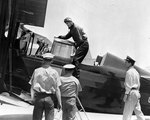Ernest King
| Surname | King |
| Given Name | Ernest |
| Country | United States |
| Category | Military-Sea |
| Gender | Male |
Contributor: C. Peter Chen
ww2dbaseAdmiral Ernest Joseph King hated the media. He hated incompetent officers. He also hated paperwork, Englishmen, and the media. As a matter of fact, one of his six daughters said that King was "the most even-tempered man in the Navy. He is always in a rage."
ww2dbaseKing was born in Lorain, Ohio, in 1878 to a railroad repair shop foreman. He graduated from Annapolis Naval Academy in 1901, fourth in his class, with combat experience from the Spanish-American War in 1898. In 1917, he was a staff officer of the US Atlantic Fleet working closely with the Royal Navy, where he would pick up his distaste for the English, particularly the aristocratic type, which the Royal Navy was in abundance of. At the end of WW1, King would hold the rank of captain, and earned a Navy Cross.
ww2dbaseKing was a famed officer with expertise in gunnery and submarine warfare, but he knew aviation was the future of naval warfare. In the late 1920s, King took the opportunity to earn his wings (at the ripe age of 50), and took command of the carrier Lexington; US Navy doctrine at the time required carrier captains to also qualify as a member of the air crew, hence King's need to qualify as a pilot. As the skipper of an aircraft carrier, King was able to study aviation closely. He launched a mock attack against Pearl Harbor by sending his planes, dropping sacks of flour, demonstrating the port's weakness against a undetected attack from the air. Despite the mock attack being "successful", the warning fell on deaf ears. King earned flag rank in 1932, and became chief of the naval bureau in 1933. He was promoted vice admiral in 1936, given command of all carriers and aircraft in the fleet in 1938. He became a full admiral early 1941, as the commander of the recently reorganized Atlantic Fleet. Ironically, he once again had to work closely with the British. However, King was able to seprate his personal distaste of the British and the overall goal of the alliance, and was effective in partnering in operations with the Royal Navy. In Aug 1941, President Roosevelt met with Prime Minister Winston Churchill in Newfoundland, and the president chose King's flagship USS Augusta as his transport, given King the chance to become one of the president's naval advisors during the discussions. King's careful analysis of current situations made an impression on Roosevelt.
ww2dbaseWhen the Japanese struck Pearl Harbor, King would be lucky enough to be in the Atlantic. He returned to Washington very quickly, and adviced Roosevelt and Knox (Secretary of the Navy). He was soon named the Commander-in-Chief of the US Fleet. Although a hard-working and effective admiral, King was blamed for early Allied merchant shipping losses in the Atlantic. King's personal philosophy toward convoy escort was that the US Navy had too few ships that could be spared to escort civilian shipping. The direct result was that German U-Boats were able to attack cargo ships of their choosing without being contested.
ww2dbaseSource: The Pacific Campaign
Last Major Revision: Jun 2005
Ernest King Interactive Map
Photographs
 |  |  |  |
Ernest King Timeline
| 20 Dec 1941 | US Navy Admiral Ernest King was relieved of command from the Atlantic Fleet and was promoted to the Commander-in-Chief of US Fleets. |
| 30 Dec 1941 | Ernest King was officially sworn in as the Commander-in-Chief of US Fleet. |
| 2 Jan 1942 | Ernest King ordered Chester Nimitz to plan a raid against Japanese positions in the Gilbert Islands and the Marshall Islands in order to establish an offensive momentum in the Pacific War. |
| 21 Feb 1942 | US Navy Admiral Ernest King presented plans to US President Franklin Roosevelt for conducting the war in the South Pacific for the following 18 months. |
| 5 Mar 1942 | US Navy Admiral Ernest King said to US President Franklin Roosevelt "we cannot in honor let Australia and New Zealand down". |
| 9 Mar 1942 | US Navy Admiral Ernest King was appointed Chief of Naval Operations; he was to maintain his responsibility as the Commander-in-Chief (CominCh) of the US Navy. |
| 25 Mar 1942 | US Navy Admiral King ordered a base to be established at Efate, New Hebrides. |
| 14 May 1942 | Admiral Ernest King finally agreed to allow Vice Admiral Adolphus Andrews to organize cutters and other small armed vessels to protect shipping on the US Atlantic coast. |
| 17 May 1942 | From Washington DC, United States, Ernest King sent Chester Nimitz a message noting that King was now in agreement with the theory that Midway Atoll was likely one of the primary targets in the upcoming Japanese offensive. Later in the day, King messaged Harold Stark in London, England, United Kingdom, ordering him to relay the explanation for the US Navy removing two carriers from the South Pacific to British liaison officers. Also on this day, the US Office of Naval Intelligence also voiced its agreement in a report to King that the Japanese Navy code name AF was likely Midway Atoll. |
| 21 Oct 1942 | US Navy Admiral Ernest King notified commanders in the Pacific area commanders that the Joint Chiefs of Staff had agreed to strengthen the air forces in the South Pacific by 1 Jan 1943. |
| 18 Dec 1943 | US Chief of Naval Operations Ernest King decreed that helicopter training would be carried out at Floyd Bennett Field, New York, United States by the US Coast Guard. |
| 17 Dec 1944 | Ernest King was promoted to the rank of fleet admiral. |
Please consider supporting us on Patreon. Even $1 per month will go a long way! Thank you. Please help us spread the word: Stay updated with WW2DB: |
Visitor Submitted Comments
14 Sep 2009 09:06:22 AM
King's refusal to adopt convoys early in the war, as recommended by the experienced British, would cost many an American sailor his life. He should really have been sacked by Roosevelt for this alone.
28 Nov 2014 09:07:07 AM
Agreed with Alan Chanter, 297 Allied Merchant ships were lost totaling over 2 million tons due to the lack of costal blackouts and American convoys, both were recommended to King by the Royal Navy. King outright refused these based on his hatred of the British. Page 202 of Karl Dönitz's Memoirs "Ten Years and Twenty Days" highlights Americas lack of wartime preparations
8 Mar 2015 10:54:18 AM
King was given on a plate a prototype of a proximity fuse by the Tizzard mission in 1940, the yanks were asked to develop it (along side a whole bunch of other British inventions, designs and ideas)The fuse was accepted, (but a means of propelling it through a barrel without it exploding was needed) that's what the American engineers had to create. Because the US Navy was involved in the design of the propellant/charge etc, and it cost them money, the yanks refused the British request to use the proximity fuse saying that the Germans might capture and reproduce the shell themselves. They only relented when swarms of V1's started entering British airspace. It's nice to think that this was one of many, many British developments/inventions that helped the USA win the war.
2 Oct 2019 01:46:51 PM
I don't think these comments about King's early-war resistance to the convoy system are fair.
I don't have the impression that his decisions in that regard were capricious or just based on personal anti-British sentiment.
I think his decision was justifiable, at least in principle, on a tactical level; he was concerned that the Navy didn't have the strength to provide proper escorts (I'm not sure if this was true, or, if so, whether it was because of the "Destroyers for Bases" deal). Put simply, an unescorted individual ship is less vulnerable than an unescorted convoy, as it's harder to find. And if it is found, only that ship will be attacked, as opposed to a giant group of them.
Again, I'm not sure if King's assumptions were correct, but he, unlike us, didn't have the benefit of hindsight; he had the fog of war to contend with.
King reached retirement age in 1942, which would have provided a way to "fire" him without actually firing him. Instead, Roosevelt, himself a Navy man, kept King on all the way to the end. Clearly he must have seen something in the man.
30 Oct 2019 02:00:15 AM
When Admiral Sir Andrew Cunningham arrived in Washington as the British Admiralty’s representative on the Combined Chiefs of Staff Committee his request for an interview with his opposite number was met with the response that Admiral King was busy and could not see him for six days. Infuriated, Cunningham called a Joint Chiefs of Staff meeting at which he apologised for wasting their time but explained that this had been forced on him as he had urgent matters he needed to discuss about joint naval matters. His ploy worked and he got his interview with King. However Admiral King’s uncooperative attitude continued to be extremely rude ad brittle. Matters came to a head over the issue of the US Navy providing a handful of submarines for work in the Atlantic. When King rudely brushed the matter aside Cunningham finally lost patience and snapped back exactly what he thought about Admiral King’s ‘method of advancing Allied unity and amity’. Shaken, Admiral King apologised but it wouldn’t be long before the two would be at loggerheads once again.
27 Apr 2021 07:22:12 PM
I had no idea that Adm. King was such a nice guy. Kind of like Ty Cobb.
All visitor submitted comments are opinions of those making the submissions and do not reflect views of WW2DB.

» Atlantic Charter Conference
» First Washington Conference
» Casablanca Conference
» Trident Conference
» Quadrant Conference
» Octagon Conference
» Malta Conference
» Typhoon Connie
» Potsdam Conference
Document(s):
» Message from Marshall and King to Returning Personnel
Related Books:
» Roosevelt's Centurions
- » 1,182 biographies
- » 337 events
- » 45,115 timeline entries
- » 1,248 ships
- » 350 aircraft models
- » 207 vehicle models
- » 376 weapon models
- » 123 historical documents
- » 261 facilities
- » 470 book reviews
- » 28,414 photos
- » 365 maps
James Forrestal, Secretary of the Navy, 23 Feb 1945
Please consider supporting us on Patreon. Even $1 a month will go a long way. Thank you!
Or, please support us by purchasing some WW2DB merchandise at TeeSpring, Thank you!
28 Apr 2005 06:08:11 PM
Is this the King who devised the Island Hopping Campaign of the Pacific in WWII?